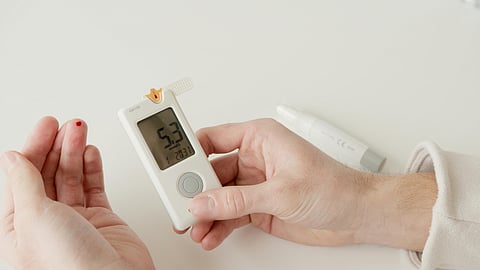
- NEWS
- the EDIT
- COMMENTARY
- BUSINESS
- LIFE
- SHOW
- ACTION
- GLOBAL GOALS
- SNAPS
- DYARYO TIRADA
- MORE

As 4.7 million Filipinos continue to grapple with Type 2 Diabetes (T2D), health experts are urging the public to seek early screening, intervention, and disease management strategies, highlighting how proactive action can lead to better health outcomes.
"For too long, diabetes has been a silent battle for many Filipinos," Dr. Bien Matawaran, chief of the Section of Endocrinology, Diabetes and Metabolism at the University of Santo Tomas Hospital, said.
"Our goal today is not merely to dwell on the problems of this disease, but to forge a path forward—a path built on collaboration, stronger support systems, and a genuine understanding of what this condition truly is," Matawaran added.
Type 2 Diabetes is a chronic condition where the body becomes resistant to insulin or doesn't make enough of it. Insulin is a vital hormone that helps sugar, particularly glucose, from food enter the cells to be used for energy.
When this process doesn't work efficiently, glucose builds up in the bloodstream, leading to elevated blood sugar levels. Left unmanaged, this can lead to several complications, including Chronic Kidney Disease (CKD), which around 40 percent of T2D patients develop during their lifetime.
Dr. Lora May Tin-Hay, president of the Philippine College of Endocrinology, Diabetes and Metabolism, explained that T2D is a condition where the body's cells struggle to effectively use glucose from food, or the body doesn’t produce enough insulin to manage it.
“It’s not just about what we eat; it’s a true lifestyle disease influenced by multiple factors," she continued.
Tin-Hay added that the amount of food consumed, level of physical activity, and genetic history all play significant roles in determining a person's risk for developing T2D and CKD.
“But the good news remains the same: with early detection and proper, comprehensive management that addresses these factors, we can work to prevent complications,” she said.
According to 2024 data from the International Diabetes Federation (IDF), approximately 7.5 percent — or an estimated 4.7 million — Filipinos aged 20 to 79 years are living with the disease.
The same statistics also show that an estimated 53.5 percent of adults in the country remain undiagnosed, highlighting the urgent need for early T2D screening.
The 2023 National Nutrition Survey of the Department of Science and Technology's Food and Nutrition Research Institute revealed that two out of every ten Filipino adults aged 20 to 59 are pre-diabetic—indicating a large population is at high risk of progressing to Type 2 Diabetes if not addressed promptly.
The Philippine Statistics Authority also reported that diabetes was the fifth leading cause of mortality among Filipinos from January to November 2024, emphasizing its severe impact on national health.
“The greatest challenge is bridging the final gap: the gap between knowledge and action," Dr. Nines Bautista of Diabetes Philippines said.
"The healthcare professional’s role is to be a translator — to distill complex clinical data into a simple reason why a patient should take a new pill. True innovation happens when a patient leaves our clinics with a clear, manageable plan they feel empowered to follow.”
Bautista added that T2D patients are also advised to take CKD screenings that can significantly slow or even halt the progression of kidney damage, helping them avoid dialysis and transplant.
“True prevention is multi-layered,” Tin-Hay added, noting that it begins with early prevention—starting with healthy lifestyles to prevent chronic conditions like obesity, hypertension, and diabetes from ever developing.
She said that for those already diagnosed, the focus shifts to effectively managing their condition and preventing it from leading to kidney failure.
“Each of these steps is a smarter investment in our future. It is far more cost-effective to support wellness and early management than it is to pay for dialysis sessions later on.”
For its part, the Philippine Health Insurance Corp. (PhilHealth) reaffirmed its commitment to enhancing comprehensive healthcare for Filipinos with T2D by emphasizing ongoing improvements in its services.
Dr. Lydia Ann Labro, a representative for PhilHealth, assured the public that the agency is continuously enhancing the support it provides to patients.
“Our goal is to ensure that comprehensive health services are not just available, but truly accessible — such as our newly announced Yaman sa Kalusugan Program (YAKAP), an initiative which expands the list of essential medicines and services, which will benefit millions of Filipino patients," Labro said.
She added that they are also strengthening partnerships with healthcare professionals, from rural health units to specialized hospitals, to improve the quality and integration of care across the country — making it easier for members to access benefits.
